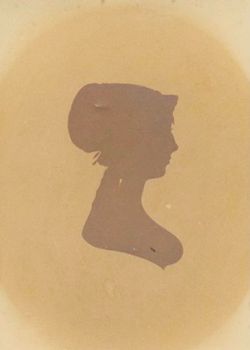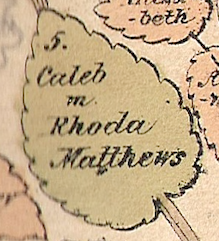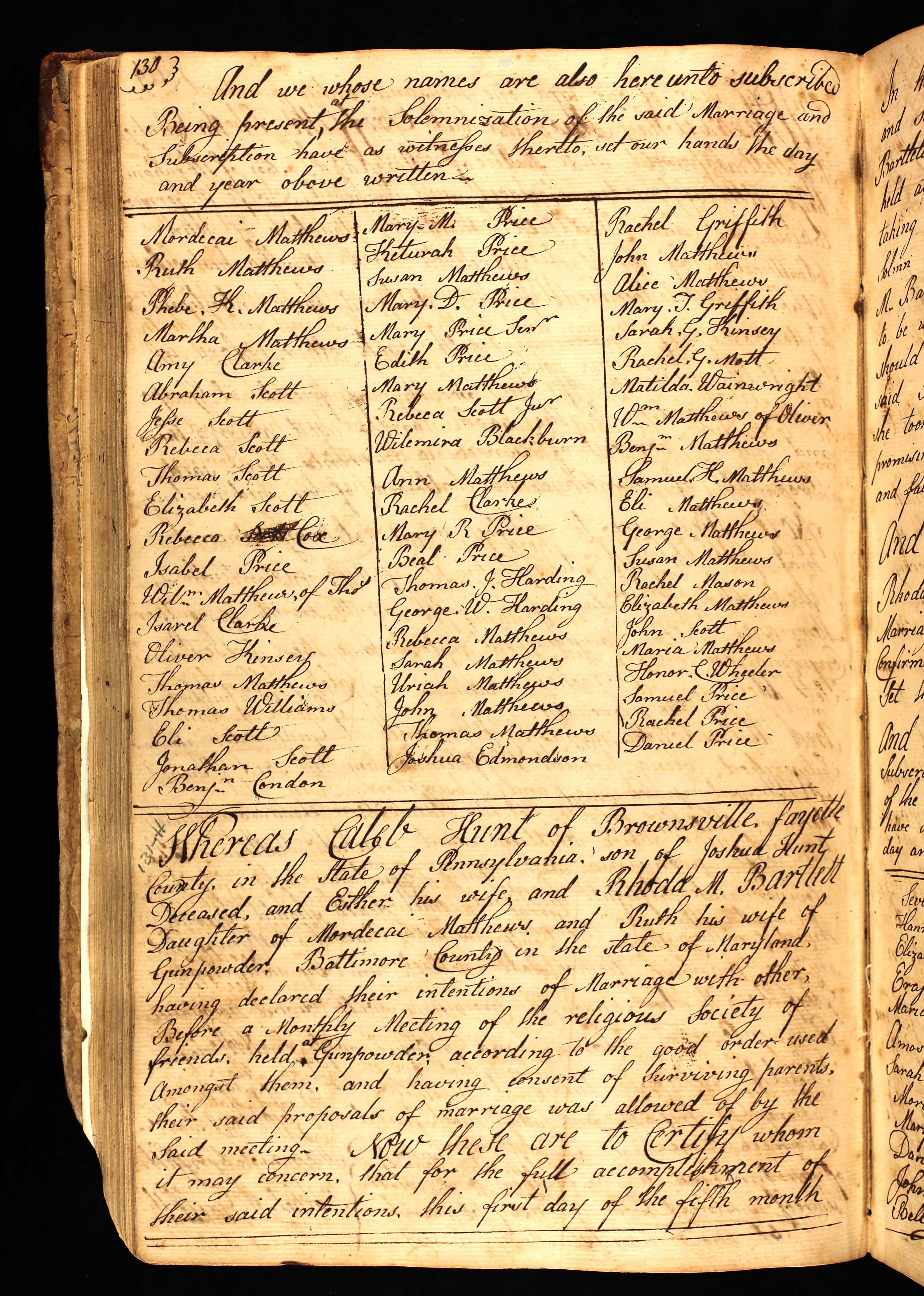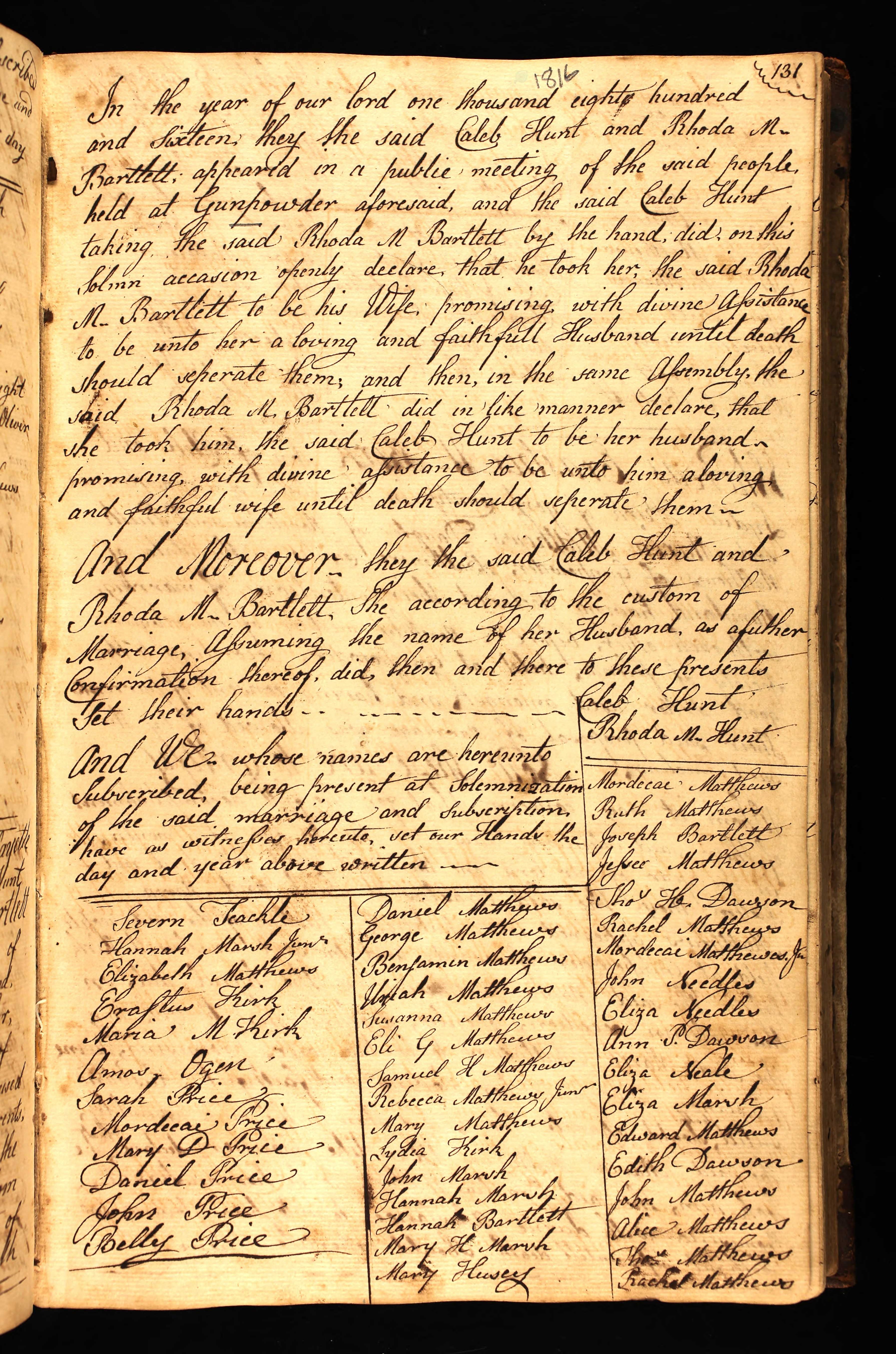In 1727, Rhoda's Matthews ancestors settled in Maryland's Baltimore County where their descendants would reside for more than two centuries. Rhoda, with her parents and seven siblings, lived at their home farm that was surrounded by the Western Run Valley's idyllic farmland and scenic landscapes. In 1808, Rhoda's father, Mordecai Matthews, built PLEASANT MEADOWS, a country house of stone that would be his offspring's homestead for three generations and a historic landmark for more than 200 years.
During June of 1802, Rhoda began her studies at Westtown School. [1.]
On December 12, 1806, Elisha Hunt and Mary Hussey, Rhoda's aunt, were married at Baltimore. Afterward, Rhoda, relatives and guests celebrated with the newlyweds. Among the celebrants was the groom's brother, Nathan Hunt, who would become Rhoda's brother-in-law.
In 1808, Joseph Bartlett, while on a homeward journey by horseback from Ohio to Easton, Maryland, made a visit to Rhoda, "the maiden at Gunpowder by whom he had been sorely smitten." [2.] His courtship of her continued until June 20, 1809 when Joseph and "Rhoda M. Bartlett" were married in the Old Gunpowder Friends Meetinghouse. [3.] John Needles, Joseph's good friend, attended the marriage ceremony, celebration and journey homeward to Easton with the newlyweds. John was hoping to finally meet Rhoda's younger sister, Eliza, but she was at Westtown School. [1.] John was persistant, however, until he and Eliza were married. Once again, while attending a family wedding, Rhoda met a future brother-in-law. [3.]
Rhoda and Joseph lived near Easton at "Wakefield" that consisted of a brick home and 133-acre farm. Since 1698, it had been part of the Bartlett family's "Ratcliffe Mannor" estate. Joseph died at "Wakefield" on February 24, 1810. [2.]
Gunpowder Monthly Meeting minutes for April 25, 1810:
"Rhoda M Bartlett being left a widow and again left to reside within the verge of this meeting produced the certificate granted her with an endorsement from Third Haven Monthly Meeting - dated 3 mo 15th 1810 which was received."
After removing from "Wakefield" to PLEASANT MEADOWS, Rhoda gave birth to Joseph Bartlett, Jr. on May 26, 1810. With her husband's death, "Wakefield" became Rhoda's dower property, providing her with income until her demise when Joseph, Jr. would inherit the property. [2.] On November 22 1834, "Joseph Bartlett, City of Baltimore" sold "Wakefield" to Thomas R. Dawson.
Letters between sisters Mary (Hussey) Hunt and Ruth (Hussey) Matthews, living 230 miles apart, were frequent and full of family news. News about Rhoda and Caleb would certainly be included, particularly about his trips to Saint Louis [5.] and Louisiana, as well as his involvement with the historic steamboat "Enterprise", including her role in the Battle of New Orleans. The "Enterprise" was a frequent subject in the nation's newspapers, including Baltimore's "Niles' Weekly Register". [6.] It's likely the Hussey sisters were matchmakers.
Aunt Mary's letters informed Rhoda that Caleb had purchased a lot in Bridgeport where he built a home.
On May 1, 1816, the Old Gunpowder Friends Meetinghouse on Beaver Dam Road, Baltimore County was the setting for the marriage ceremony of two sisters. The couples were Rhoda M. Bartlett and Caleb Hunt, and Maria Matthews and Erastus U. Kirk. Rhoda signed both marriage certificates as "Rhoda M. Hunt".
Rhoda, Caleb, Joseph, Jr. and their growing family lived next to the east bank of the Monongahela River in one of the "homes of Bridgeport, each with its setting of green trees and grounds." The Redstone Friends meetinghouse and school, where the family worshipped and the children studied, were nearby. Aunt Mary's family, who lived in the rear of their store on Market Street in Brownsville, were a brief walk away. Joseph, Jr. and Emmor, Elisha and Mary's son, became close mutual friends.
The children of Caleb and Rhoda M. Hunt:
i. Alfred, b. April 5, 1817
ii. Eliza, b. October 10, 1818
iii. Ruth Ann, b. November 25, 1819
iv. Mary Hussey, b. March 7, 1821
v. Edmund, b. November 4, 1822
vi. Elisha Hussey, b. Sept. 14, 1824
vii. Mordecai, b. August 13, 1828
Mary (Hussey) Hunt's letter of June 6, 1818 to her mother-in-law Esther Collins: "Rhoda has a little appearance today of the Erycipolis [erysipelas] in her face but I hope It will not be bad."
"15th of 11th mo- Sister Rhoda Hunt deceased; was ill about six weeks with a hasty consumption; bore her suffering with much patience, manifesting sweet tranquility to the closing moment." [7.]
Rhoda passed away "about 2 o'clock P.M.- as quiet & easy as if she was going to sleep." She was buried the following day. [8.]
Mary, Rhoda's youngest daughter, wrote in her diary:
"Oh if my mother had been permitted to live how happy I would be . . ."
"22 years this day since my mother's death a loss to me never to be repaired . . ." "but often very often have I longed for her tender care, council and advice . . ."
Sources:
1. Susanna Smedley (1945). "Catalog of Westtown through the years, . . .". Philadelphia: Lyon & Armor, Pages 9, 26.
2. R. Bernice Leonard (1984). "Twig and turf II: Bartlett and allied families, 1693-1984". Pages 12, 13, 116.
3. Republican Star [Easton, Md.], July 4, 1809.
4. Edward Needles Wright (1969). "John Needles (1786-1878): An Autobiography". Quaker History, The Bulletin of Friends Historical Association, 58 (1): Pages 3–21.
5. Caleb Hunt's diary (1812).
6. Niles' Weekly Register [Baltimore, Md.], Feb. 4 & July 1, 1815.
7. Mary (Hussey) Hunt's diary
8. Elisha Hunt's letter to his son
Wikipedia: John Needles
In 1727, Rhoda's Matthews ancestors settled in Maryland's Baltimore County where their descendants would reside for more than two centuries. Rhoda, with her parents and seven siblings, lived at their home farm that was surrounded by the Western Run Valley's idyllic farmland and scenic landscapes. In 1808, Rhoda's father, Mordecai Matthews, built PLEASANT MEADOWS, a country house of stone that would be his offspring's homestead for three generations and a historic landmark for more than 200 years.
During June of 1802, Rhoda began her studies at Westtown School. [1.]
On December 12, 1806, Elisha Hunt and Mary Hussey, Rhoda's aunt, were married at Baltimore. Afterward, Rhoda, relatives and guests celebrated with the newlyweds. Among the celebrants was the groom's brother, Nathan Hunt, who would become Rhoda's brother-in-law.
In 1808, Joseph Bartlett, while on a homeward journey by horseback from Ohio to Easton, Maryland, made a visit to Rhoda, "the maiden at Gunpowder by whom he had been sorely smitten." [2.] His courtship of her continued until June 20, 1809 when Joseph and "Rhoda M. Bartlett" were married in the Old Gunpowder Friends Meetinghouse. [3.] John Needles, Joseph's good friend, attended the marriage ceremony, celebration and journey homeward to Easton with the newlyweds. John was hoping to finally meet Rhoda's younger sister, Eliza, but she was at Westtown School. [1.] John was persistant, however, until he and Eliza were married. Once again, while attending a family wedding, Rhoda met a future brother-in-law. [3.]
Rhoda and Joseph lived near Easton at "Wakefield" that consisted of a brick home and 133-acre farm. Since 1698, it had been part of the Bartlett family's "Ratcliffe Mannor" estate. Joseph died at "Wakefield" on February 24, 1810. [2.]
Gunpowder Monthly Meeting minutes for April 25, 1810:
"Rhoda M Bartlett being left a widow and again left to reside within the verge of this meeting produced the certificate granted her with an endorsement from Third Haven Monthly Meeting - dated 3 mo 15th 1810 which was received."
After removing from "Wakefield" to PLEASANT MEADOWS, Rhoda gave birth to Joseph Bartlett, Jr. on May 26, 1810. With her husband's death, "Wakefield" became Rhoda's dower property, providing her with income until her demise when Joseph, Jr. would inherit the property. [2.] On November 22 1834, "Joseph Bartlett, City of Baltimore" sold "Wakefield" to Thomas R. Dawson.
Letters between sisters Mary (Hussey) Hunt and Ruth (Hussey) Matthews, living 230 miles apart, were frequent and full of family news. News about Rhoda and Caleb would certainly be included, particularly about his trips to Saint Louis [5.] and Louisiana, as well as his involvement with the historic steamboat "Enterprise", including her role in the Battle of New Orleans. The "Enterprise" was a frequent subject in the nation's newspapers, including Baltimore's "Niles' Weekly Register". [6.] It's likely the Hussey sisters were matchmakers.
Aunt Mary's letters informed Rhoda that Caleb had purchased a lot in Bridgeport where he built a home.
On May 1, 1816, the Old Gunpowder Friends Meetinghouse on Beaver Dam Road, Baltimore County was the setting for the marriage ceremony of two sisters. The couples were Rhoda M. Bartlett and Caleb Hunt, and Maria Matthews and Erastus U. Kirk. Rhoda signed both marriage certificates as "Rhoda M. Hunt".
Rhoda, Caleb, Joseph, Jr. and their growing family lived next to the east bank of the Monongahela River in one of the "homes of Bridgeport, each with its setting of green trees and grounds." The Redstone Friends meetinghouse and school, where the family worshipped and the children studied, were nearby. Aunt Mary's family, who lived in the rear of their store on Market Street in Brownsville, were a brief walk away. Joseph, Jr. and Emmor, Elisha and Mary's son, became close mutual friends.
The children of Caleb and Rhoda M. Hunt:
i. Alfred, b. April 5, 1817
ii. Eliza, b. October 10, 1818
iii. Ruth Ann, b. November 25, 1819
iv. Mary Hussey, b. March 7, 1821
v. Edmund, b. November 4, 1822
vi. Elisha Hussey, b. Sept. 14, 1824
vii. Mordecai, b. August 13, 1828
Mary (Hussey) Hunt's letter of June 6, 1818 to her mother-in-law Esther Collins: "Rhoda has a little appearance today of the Erycipolis [erysipelas] in her face but I hope It will not be bad."
"15th of 11th mo- Sister Rhoda Hunt deceased; was ill about six weeks with a hasty consumption; bore her suffering with much patience, manifesting sweet tranquility to the closing moment." [7.]
Rhoda passed away "about 2 o'clock P.M.- as quiet & easy as if she was going to sleep." She was buried the following day. [8.]
Mary, Rhoda's youngest daughter, wrote in her diary:
"Oh if my mother had been permitted to live how happy I would be . . ."
"22 years this day since my mother's death a loss to me never to be repaired . . ." "but often very often have I longed for her tender care, council and advice . . ."
Sources:
1. Susanna Smedley (1945). "Catalog of Westtown through the years, . . .". Philadelphia: Lyon & Armor, Pages 9, 26.
2. R. Bernice Leonard (1984). "Twig and turf II: Bartlett and allied families, 1693-1984". Pages 12, 13, 116.
3. Republican Star [Easton, Md.], July 4, 1809.
4. Edward Needles Wright (1969). "John Needles (1786-1878): An Autobiography". Quaker History, The Bulletin of Friends Historical Association, 58 (1): Pages 3–21.
5. Caleb Hunt's diary (1812).
6. Niles' Weekly Register [Baltimore, Md.], Feb. 4 & July 1, 1815.
7. Mary (Hussey) Hunt's diary
8. Elisha Hunt's letter to his son
Wikipedia: John Needles
Family Members
Advertisement
See more Bartlett Hunt or Matthews memorials in:
- Redstone Friend's Cemetery Bartlett Hunt or Matthews
- Brownsville Bartlett Hunt or Matthews
- Fayette County Bartlett Hunt or Matthews
- Pennsylvania Bartlett Hunt or Matthews
- USA Bartlett Hunt or Matthews
- Find a Grave Bartlett Hunt or Matthews
Records on Ancestry
Advertisement



























